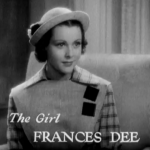 |
 |
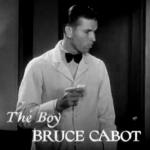 |
| Virginia Frances Dee |
Pony Ginger Rogers |
Mac Bruce Cabot |
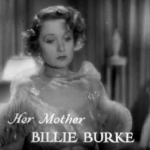 |
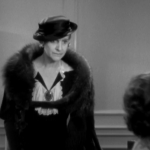 |
 |
| Helen Billie Burke |
Ms. Van Alstyne Beulah Bondi |
Frank John Halliday |
| Released by RKO | Directed By Wanda Tuchock and George Nichols Jr. |
||
Proof That It’s Pre-Code
- Schoolgirls in trouble! Drinking! Partying! Staying up late with boys in hotel rooms and boat houses!
- And it ends with something so then-controversial, they couldn’t even say it on screen.
Finishing School: And Starting Life
“I’ve always wanted to get fried. Just to know how it feels.”
Finishing School makes no immediate bones about the kind of movie its trying to be. Its opening credits, fashioned in that playful 1930s manner where characters are merely referred to as ‘The Girl’ or ‘The Boy’ and etc flashes across the screen. The sequence ends with “And the snob played by…”. We’re then treated to a closeup of a brochure for a private finishing school, Crockett Hall, describing it as the place for proper young ladies to go and learn, and for a mere $6,000 a year.
I’m almost tempted to call the movie unsubtle, but that was before I read other reviews of the picture where the point flew so far above their heads it may as well have escaped orbit. Crockett Hall is indeed a den for the hoity toity to instill their values in the next generation. While the headmistress, Ms. Van Alstyne, insists that being a lady is all about moral turpitude and pure thoughts, the real values are thus: don’t get caught.
This is a shock to the school’s newest inductee, Virginia. When she arrives, she’s demure and as close to sainthood as a teenage girl can be. By the time she leaves, she’s gotten a taste for everything in life, both the finer and the less-than-such. That turns Virginia into a pariah, and a unique one for this film’s place in history.
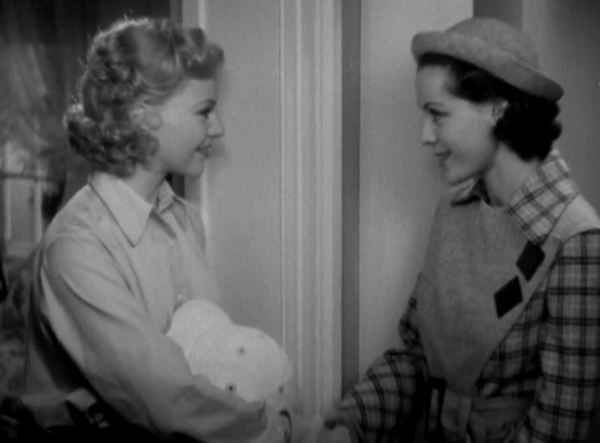
Friends forever.
Virginia’s roommate, Pony, is the one to quickly teach her the ropes, sneaking her out of the school for a weekend on the town with boys and drinking, a reward for being a good friend. Unfortunately, one of the boys tries to get a little too fresh on Virginia, and he’s laid flat by a busboy named Mac.
Mac is one of the more contrived inventions you may catch on screen, a doctoral student working his way through school on a busboy’s salary while being impossibly perfect. He is kind and sweet, never tries to take advantage of Virginia, knows just when to swoop in to save her, and even feeds a stray alley cat out of the goodness of his heart.
To people like Ms. Van Alstyne and Virginia’s mom, Helen, Mac is the enemy. A product of hard work rather than good breeding, he has the rough hewn sexiness of the lower class without the entitlement that someone attending Yale is expected to have. He behaves like a good, tolerable person with few or no bats in the belfry, and is exactly the kind of thing that Crockett Hall was built to keep out.
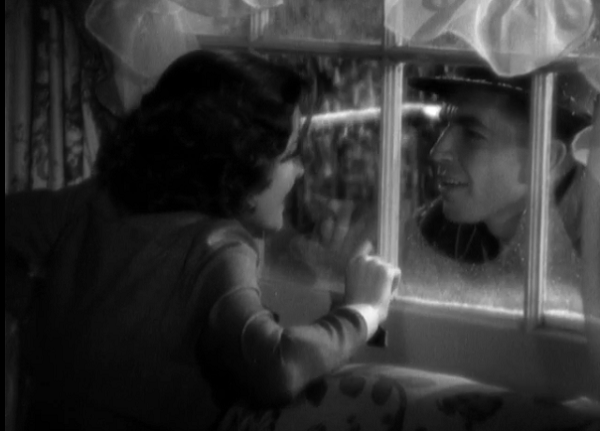
THIS WINDOW SHALL NOT DEFLECT MY MIDDLE-LOWER CLASS SEXINESS. BEWARE!
One scene really nails the attitude of Crockett, and that’s a classroom lecture to a room of young women about the works of Tolstoy. They’re not reading his books, but they are expected to know a brief summary of his works. Just enough to make themselves appear intelligent, naturally. When they call it a finishing school, it’s merely a preparatory for the task of being the trophy wife of a rich man. And it will break anyone who tries to escape their foregone old money nuptials, as Virginia attempts to do.
Spoilers.
Virginia’s accidental escape plan involves getting knocked up by Mac on Christmas Eve in the boat house. Because of when the film was made at the tail end of the pre-Code era, it cannot actually say that she’s pregnant, only imply it through the passage of time and Frances Dee’s increasingly unhinged performance.
The climax is both Virginia’s mother and Ms. Van Alstyne cornering Virginia is a double attempt to shame her. “The school’s reputation!” cries Van Alstyne. “What will my friends think!” shrieks her mother. Virginia, who’d just been getting an overview of Anna Karenina, almost ends it when Mac makes another one of his patented ‘nick of time’ arrivals.
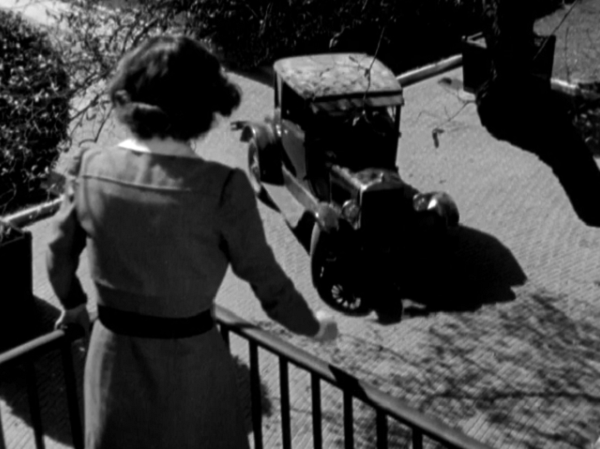
“I can’t kill myself, not as long as that bitchin’ ride is close by!”
Also on hand is Virginia’s absentee father, Frank. He’d earlier shown up to brazenly suggest that Virginia be allowed to do whatever she pleased with her life, and here he shakes Mac’s hand in congratulations at their now-impending nuptials.
The implication is that it is catty women who control the social lives of young women while wise and patient men know better and have more empathy. It’s a fairly ridiculous conclusion, but, I suppose, something easier to swallow for the audience than the more bleak supposition that every aspect of the upper class is actively geared towards preventing the ascension of good, hardworking people to its ranks.
End spoilers.
There are some great moments in Finishing School even if it feels a bit inconsistent. One scene featuring one of the girls ripping off her own braces so as to avoid catcalls from boys is horrifying (especially to someone who had their own metal mouth for years), and another long silent take of Dee trying to overcome her Christmas grief contains some nuanced acting beats.
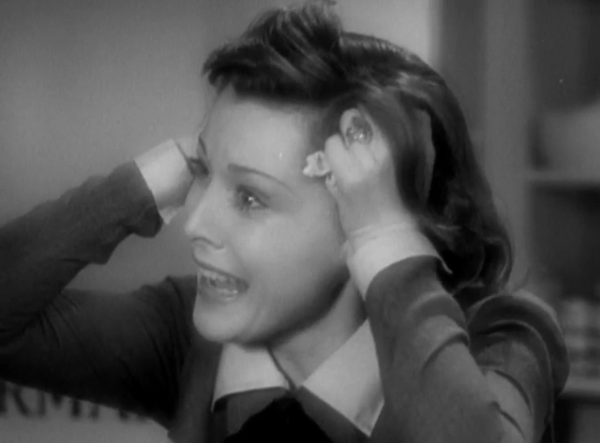
That’s not to say that all of Dee’s acting is nuanced.
However, while the film’s commentary is interesting and Ginger Rogers shines in a supporting role– with no guesses as to whether Pony or Virginia’s names are meant to be more suggestive– the film definitely feels a little too on the nose, even for a preachment yarn.
Finishing School is an alright movie with some great pre-Code flourishes. Depending on how willing you are to suck down its castor oil, it’s a timely reminder that the divide between the upper class and the middle isn’t so much just from the dollars in a bank account but by the means of a very self conscious and destructive agenda.
Trivia & Links
- For its portrayals of out of wedlock pregnancy, smoking and drinking by underage schoolgirls, and the fact that the film doesn’t seem to discourage an ounce of this, Finishing School was condemned by the Legion of Decency.
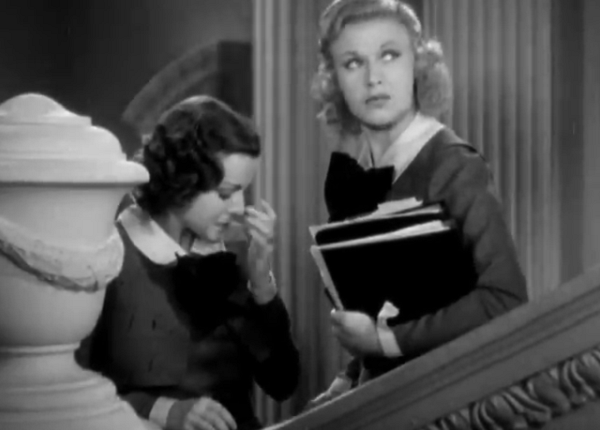
Trapped on a staircase. Uh, and between good and bad, naturally.
- This is one of the weirder things I noticed, but one scene has both Virginia and Pony under their covers and reading books by lamps to avoid post-curfew detection. The novel that Pony is poking through is called Purple Passion, which does not appear to real book. However, it is one of the novels that Kenneth Bixby (Warren William) wrote in the pre-Code film Goodbye Again. I don’t know if this is a wild coincidence or if they just had the prop laying around and decided to use it.
- For those of you who do enjoy your Frances Dee, here’s a site dedicated to her.
- Mordaunt Hall for the Times absolutely savages this one. He wraps up as such:
The more one thinks of some incidents in the film the more inane they seem. But one must pity the players.
- On the other hand, Laura at Laura’s Miscellaneous Musings calls it ‘highly engrossing’. She also notes that the film was co-directed by a woman, Wanda Tuchock, a long time screenwriter. This is one of only two films she directed.
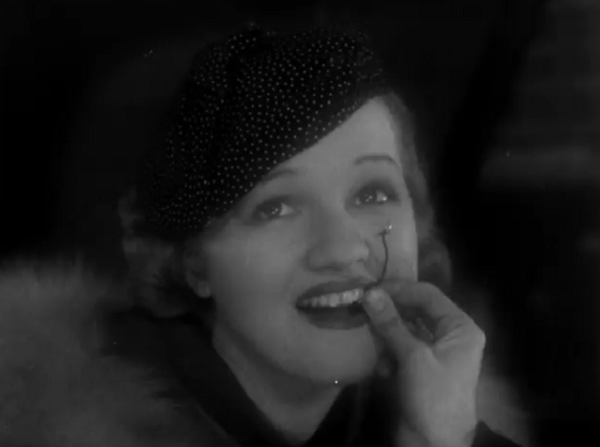
AUGHHHH
- TCMDB uses the film to talk about Ginger Rogers (their enthusiasm for Frances Dee seems to match mine) and also delves into why the film was condemned.
- John DiLeo at Screen Savers posits that much of the appeal of the movie comes from how achingly human Dee’s Virginia comes across. He notes:
I expected Dee to be horrified by the hotel room party of men and booze, yet she takes it in stride, admitting that she’d like to know what it feels like to be drunk. And drunk she gets. Wait a minute! How can that sweet young thing suddenly want to behave this way? Oh, I don’t know, maybe because she seems to be acting like a real person, in intriguingly human terrain, somewhere between complete saintliness and all-out sluttiness. Even after she’s impregnated by her new boyfriend, medical intern Bruce Cabot, the movie seeks no punishment, no finger-wagging lesson. And Cabot is no sleaze, actually a great guy who is working his way up from nothing. Remember, scripts like this one would be banished from the screen in the summer of 1934 (unless they were given complete overhauls).
- FilmFanatic.Org likes this one and recommends it, with this great observation:
What’s most fascinating about Finishing School is the way it daringly portrays the utter hypocrisy behind upper-class mores, which hold that as long as one isn’t “caught”, one can get away with just about anything; the goal is to avoid detection and public shame.
Gallery
Hover over for controls.
Awards, Accolades & Availability
- This film appeared in the Wikipedia List of Pre-Code Films.
- This film is available on Amazon and Warner Archive. I caught it over on Warner Instant.
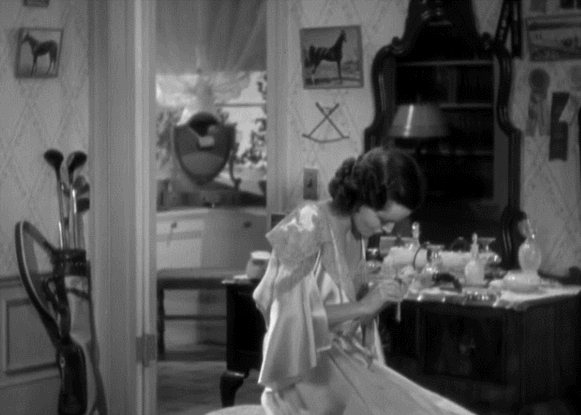 |
Comment below or join our email subscription list on the sidebar!Home | All of Our Reviews | What is Pre-Code? |




6 Comments
JennyG · January 17, 2014 at 12:42 pm
*SPOILERS*
I agree with your interpretation of the take away, which is “that it is catty women who control the social lives of young women while wise and patient men know better and have more empathy.” I might pitch it even stronger: I believe Ms. Van Alstyne was meant to be a lesbian in love with Virginia, which was depicted as her sinister motivation for keeping Virginia away from Mac–more sinister, in the film’s terms, than the snobbery. Also, am I crazy or was Virginia’s mother and Ms. Van Alstyne going to force Virginia into an abortion? I believe that was the implication of the nurse with the syringe. There’s some dark weirdness in this film, which made it interesting to me. And I LOVED Francis Dee! Finishing School was my first exposure, and I’ll be checking out her other vehicles.
Danny · January 23, 2014 at 8:36 pm
I didn’t catch onto the sexual subtext that you did as I never really felt any sexual longing coming from Van Alstyne; she just seemed domineering and micromanaging in general with the girls, but if I watch it again I’ll look for that. That last scene was hectic enough that it certainly seemed that they were going to shame her into an abortion– it’s the only ‘acceptable’ thing for her to do, though the Anna Karena option certainly had its appeal as well.
And check out Frances Dee in Blood Money if you get a chance– very pre-Code flick.
jameswharris · January 17, 2014 at 2:19 pm
For once I caught a film before reading your review. I watched Finishing School a few weeks ago on Warner Instant, and remember seeing it before years ago, probably on TCM. Last night I re-watched on Netflix disc, Flying Down to Rio, and about a week ago I re-watched Bachelor Mother on Warner Instant. So I’ve been seeing a lot of Ginger. And it was the second time this week I saw Dolores Del Rio, because I had gotten Bird of Paradise in from ClassicFlix. By the way, I got Watch TCM set up on my iPad from your suggestion. My wife has cable at her apartment where she works out of town. Your site is inspiring me to watch a lot of Pre-Code films.
Danny · January 23, 2014 at 8:39 pm
Glad to hear it, James! I’m pretty happy as it looks like I can still get Watch TCM to work over here, too. And, yeah, sometimes I’ll just start running into movies with the same actress in them over and over without meaning too– I hit Ginger surprisingly often this month, as well as Fay Wray. Can’t complain about either though!
silverscreenings · January 19, 2014 at 7:45 am
You’ve made me very keen to see this movie. Admittedly, I know next to nothing about Francis Dee’s career but I am a huge Ginger Rogers fan. Thanks for featuring this one.
Danny · January 23, 2014 at 8:42 pm
Sure! It’s definitely an interesting one.
Comments are closed.